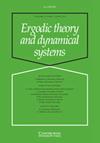Equilibrium measures for two-sided shift spaces via dimension theory
IF 0.8
3区 数学
Q2 MATHEMATICS
引用次数: 0
Abstract
Given a two-sided shift space on a finite alphabet and a continuous potential function, we give conditions under which an equilibrium measure can be described using a construction analogous to Hausdorff measure that goes back to the work of Bowen. This construction was previously applied to smooth uniformly and partially hyperbolic systems by the first author, Pesin, and Zelerowicz. Our results here apply to all subshifts of finite type and Hölder continuous potentials, but extend beyond this setting, and we also apply them to shift spaces with synchronizing words.通过维度理论实现双面移位空间的均衡度量
给定一个有限字母表上的双面移位空间和一个连续的势函数,我们给出了一些条件,在这些条件下,可以用一种类似于豪斯多夫度量的构造来描述平衡度量,这种构造可以追溯到鲍恩的研究。第一作者、Pesin 和 Zelerowicz 以前曾将这种构造应用于光滑均匀和部分双曲系统。我们这里的结果适用于有限类型的所有子移位和荷尔德连续势,但又超出了这一范围,我们还将它们应用于具有同步词的移位空间。
本文章由计算机程序翻译,如有差异,请以英文原文为准。
求助全文
约1分钟内获得全文
求助全文
来源期刊
CiteScore
1.70
自引率
11.10%
发文量
113
审稿时长
6-12 weeks
期刊介绍:
Ergodic Theory and Dynamical Systems focuses on a rich variety of research areas which, although diverse, employ as common themes global dynamical methods. The journal provides a focus for this important and flourishing area of mathematics and brings together many major contributions in the field. The journal acts as a forum for central problems of dynamical systems and of interactions of dynamical systems with areas such as differential geometry, number theory, operator algebras, celestial and statistical mechanics, and biology.

 求助内容:
求助内容: 应助结果提醒方式:
应助结果提醒方式:


